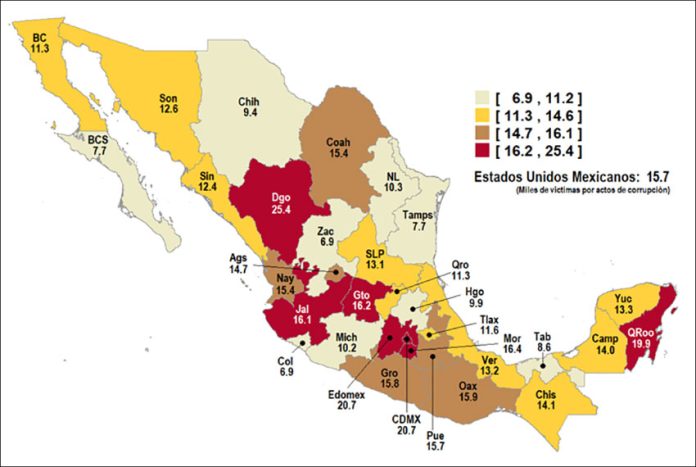The federal government’s anti-corruption agenda has succeeded in reducing people’s perceptions of the scourge but has not actually curtailed it, according to a study by the federal statistics agency Inegi.
Published on Thursday, the biennial National Survey on Governmental Quality and Impact shows that 87% of those polled in 2019 believe that corruption occurs frequently in government institutions, a 4.1% decline compared to 2017, the second last year of the corruption-plagued administration led by former president Enrique Peña Nieto.
However, the Inegi study found that there was in fact “a statistically significant increase” in corruption in 2019 – the first full year of President López Obrador’s administration – compared to two years earlier.
Inegi found that 15,732 people per 100,000 inhabitants were victims of corruption in 2019, a 7.5% increase compared to the 14,635 victims in 2017.
The statistics agency also found that the incidence of corruption increased from 25,541 acts of corruption per 100,000 residents in 2017 to 30,456 in 2019, a spike of 19.2%.
![]()
Just under 60% of those acts were related to interactions between citizens and police, Inegi found. An example is a police officer asking for a bribe – the famous mordida – from a person who committed, or allegedly committed, a crime in exchange for not proceeding with a formal charge.
Inegi found that citizens also frequently experience corruption when completing bureaucratic procedures, such as applying for a new driver’s license or requesting a police clearance certificate, and in interactions with the court system.
A request to have the electricity connected or re-connected can also prompt a counter-request for a supplementary payment to ensure that the process runs smoothly, the statistics agency found.
Inegi determined that the total paid out by citizens in corruption-plagued transactions in 2019 was 12.77 billion pesos (US $555.6 million at today’s exchange rate). The figure is 64.1% higher than in 2017 when corruption-related payments totaled 7.78 billion pesos.
An average of 3,822 pesos (US $166) was corruptly plucked from the pocket of each person affected by corruption in 2019, Inegi said, a 56% increase compared to 2017.
The prevalence of corruption was found to be worst in Guerrero, Durango and Coahuila, where more than half the total population were found to be victims of corruption last year.
However, Guanajuato – Mexico’s most violent state – recorded the biggest increase in both the prevalence of corruption (the percentage of citizens affected) and the incidence of corruption (the number of acts of corruption per capita) between 2017 and 2019. The prevalence of the scourge increased 80.6% in the Bajío region state and the incidence surged 161.2%.
The prevalence of corruption also increased in Puebla and Durango but declined in Chihuahua, Tabasco and Zacatecas. The incidence of corruption went up in Puebla, Quintana Roo and México state but declined in Baja California Sur, Nuevo León and Zacatecas.
The data showing that overall corruption has not declined since the federal government took office is a blow for López Obrador, who has made combating the scourge the raison d’etre of his administration.
The government is “sweeping away” corruption from top to bottom like a staircase is cleaned, the president often quips.
But the Inegi data indicates that eradicating corruption – a practice engrained in many parts of government and society – is far easier said than done, even though López Obrador claimed last September that there was no longer any corruption within the federal government.
On a more positive note for López Obrador, satisfaction with the federal government increased to 47.2% of respondents compared to 45.5% in 2017 — when Enrique Peña Nieto was in power — and confidence in it doubled from 25.5% of those polled three years ago to 51.2% last year.
Source: La Jornada (sp)
